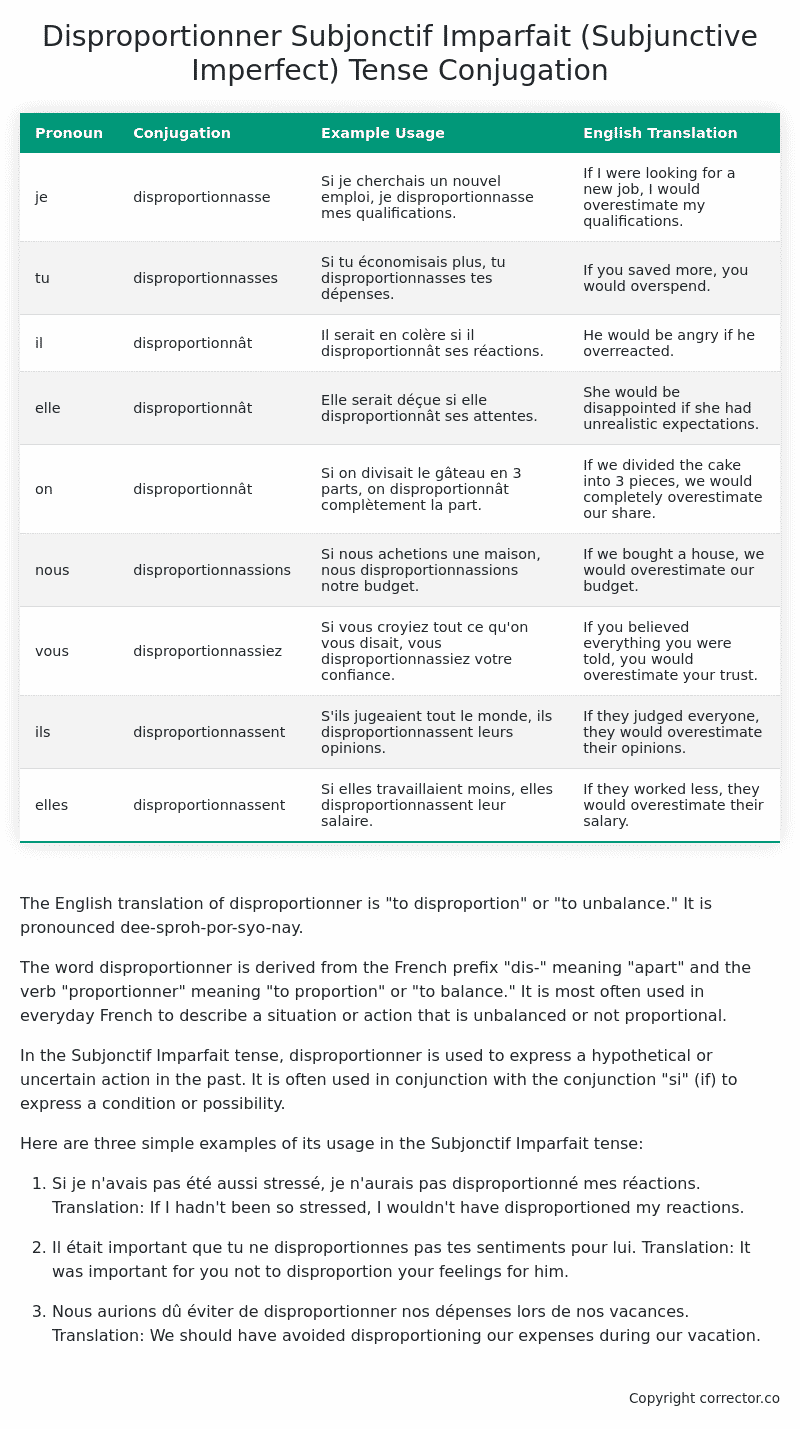Subjonctif Imparfait (Subjunctive Imperfect) Tense Conjugation of the French Verb disproportionner
Introduction to the verb disproportionner
The English translation of disproportionner is “to disproportion” or “to unbalance.” It is pronounced dee-sproh-por-syo-nay.
The word disproportionner is derived from the French prefix “dis-” meaning “apart” and the verb “proportionner” meaning “to proportion” or “to balance.” It is most often used in everyday French to describe a situation or action that is unbalanced or not proportional.
In the Subjonctif Imparfait tense, disproportionner is used to express a hypothetical or uncertain action in the past. It is often used in conjunction with the conjunction “si” (if) to express a condition or possibility.
Here are three simple examples of its usage in the Subjonctif Imparfait tense:
-
Si je n’avais pas été aussi stressé, je n’aurais pas disproportionné mes réactions.
Translation: If I hadn’t been so stressed, I wouldn’t have disproportioned my reactions. -
Il était important que tu ne disproportionnes pas tes sentiments pour lui.
Translation: It was important for you not to disproportion your feelings for him. -
Nous aurions dû éviter de disproportionner nos dépenses lors de nos vacances.
Translation: We should have avoided disproportioning our expenses during our vacation.
Table of the Subjonctif Imparfait (Subjunctive Imperfect) Tense Conjugation of disproportionner
| Pronoun | Conjugation | Example Usage | English Translation |
|---|---|---|---|
| je | disproportionnasse | Si je cherchais un nouvel emploi, je disproportionnasse mes qualifications. | If I were looking for a new job, I would overestimate my qualifications. |
| tu | disproportionnasses | Si tu économisais plus, tu disproportionnasses tes dépenses. | If you saved more, you would overspend. |
| il | disproportionnât | Il serait en colère si il disproportionnât ses réactions. | He would be angry if he overreacted. |
| elle | disproportionnât | Elle serait déçue si elle disproportionnât ses attentes. | She would be disappointed if she had unrealistic expectations. |
| on | disproportionnât | Si on divisait le gâteau en 3 parts, on disproportionnât complètement la part. | If we divided the cake into 3 pieces, we would completely overestimate our share. |
| nous | disproportionnassions | Si nous achetions une maison, nous disproportionnassions notre budget. | If we bought a house, we would overestimate our budget. |
| vous | disproportionnassiez | Si vous croyiez tout ce qu’on vous disait, vous disproportionnassiez votre confiance. | If you believed everything you were told, you would overestimate your trust. |
| ils | disproportionnassent | S’ils jugeaient tout le monde, ils disproportionnassent leurs opinions. | If they judged everyone, they would overestimate their opinions. |
| elles | disproportionnassent | Si elles travaillaient moins, elles disproportionnassent leur salaire. | If they worked less, they would overestimate their salary. |
Other Conjugations for Disproportionner.
Le Present (Present Tense) Conjugation of the French Verb disproportionner
Imparfait (Imperfect) Tense Conjugation of the French Verb disproportionner
Passé Simple (Simple Past) Tense Conjugation of the French Verb disproportionner
Passé Composé (Present Perfect) Tense Conjugation of the French Verb disproportionner
Futur Simple (Simple Future) Tense Conjugation of the French Verb disproportionner
Futur Proche (Near Future) Tense Conjugation of the French Verb disproportionner
Plus-que-parfait (Pluperfect) Tense Conjugation of the French Verb disproportionner
Passé Antérieur (Past Anterior) Tense Conjugation of the French Verb disproportionner
Futur Antérieur (Future Anterior) Tense Conjugation of the French Verb disproportionner
Subjonctif Présent (Subjunctive Present) Tense Conjugation of the French Verb disproportionner
Subjonctif Passé (Subjunctive Past) Tense Conjugation of the French Verb disproportionner
Subjonctif Imparfait (Subjunctive Imperfect) Tense Conjugation of the French Verb disproportionner (this article)
Conditionnel Présent (Conditional Present) Tense Conjugation of the French Verb disproportionner
Conditionnel Passé (Conditional Past) Tense Conjugation of the French Verb disproportionner
L’impératif Présent (Imperative Present) Tense Conjugation of the French Verb disproportionner
L’infinitif Présent (Infinitive Present) Tense Conjugation of the French Verb disproportionner
Struggling with French verbs or the language in general? Why not use our free French Grammar Checker – no registration required!
Get a FREE Download Study Sheet of this Conjugation 🔥
Simply right click the image below, click “save image” and get your free reference for the disproportionner Subjonctif Imparfait tense conjugation!

Disproportionner – About the French Subjonctif Imparfait (Subjunctive Imperfect) Tense
Formation
Common Everyday Usage Patterns
Interactions with Other Tenses
Subjonctif Présent
Indicatif Passé Composé
Conditional
Conditional Perfect
Summary
I hope you enjoyed this article on the verb disproportionner. Still in a learning mood? Check out another TOTALLY random French verb conjugation!


